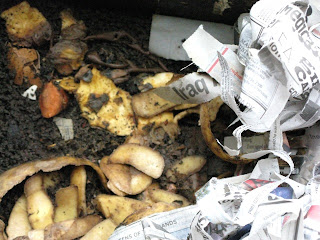 You may be wondering why a man has a bowl full of shredded newspaper and is spritzing it with water.
You may be wondering why a man has a bowl full of shredded newspaper and is spritzing it with water.Very well, I'll tell you.
This is the bedding for my worms. I have hundreds of them squirming around in a three-story "worm hotel" where the worms turn my kitchen scraps into some of the world's richest compost.
Every few days I take a handfull of potato peels and apple cores and carrot ends--all the various stuff that piles up in a busy kitchen--and drop it into my writhing colony of worms. Within a few days, they will have gobbled it up and left behind their "castings"--another way of saying worm poop--which I can then feed to my plants.
This being February, there's not a lot of plant feeding going on. But I continue to feed the worms and they continue to make castings. More and more casting till things warm up outside. You could, of course, also use them to feed your house plants.
The worms are shy and don't care for light, so it's important to keep them covered with shredded newspaper. Shredding the newspaper is a fine activity for a rainy afternoon. Use a spray bottle to get the paper damp b
 efore laying a nice thick layer over the worms. Soon enough, they will have eaten the newspaper as well and it will be time to shred some more.
efore laying a nice thick layer over the worms. Soon enough, they will have eaten the newspaper as well and it will be time to shred some more.It's wonderful how the worms recycle everything this way. And since I am hearing from more and more urbanites who want to compost their food wastes rather than sending them to the landfill, this is one of the things I recommend. It's especially useful for people who live in apartments or don't have space for even a small compost bin. The worms will live very happily--and quietly--in a coat closet.
Do they smell? Not at all. Odors in composting come from anaerobic bacteria that survive in moist places without oxygen. As long as there is air for the worms to breath, you won't have a probelm with smelly bacteria. Sometimes there is an issue with fruit flies. But I find you can really keep the fruit flies at bay if you maintain a thick layer of shredded newspaper on top of the worms and kitchen scraps.
People sometimes ask where I dig for my worms and I hasten to tell them that these are not ordinary earthworms but a variety commonly called "red wigglers," the kind you would find at a bait shop. In fact, you can make your initial purchase of worms at a bait shop, or order them on-line. I bought a home from them that works by staging one plastic bin on top of another. As one bin fills with castings, you add an empty bin and the worms pick up and move. But you can also make your own worm bin with a large plastic container. Be sure to drill some air holes, and a place for liquid to drain out is a nice feature.
A book called "Worms Eat My Garbage," by Mary Appelhof, will tell you everything you need to know about keeping worms for composting. Or you can consult some of the on-line resources listed on the lower right-hand side of this page.
It's one small way to help save the planet and grow food as well.










6 comments:
Thank you for the wonderful information. I have been interested in composting (in an apartment)for a while. Would it be possible for you to post some links and photos as to how to set up the "worm hotel" and where to purchase worms online? Do you have the bins on the floor or on the counter?
Thanks,
Alice
I haven't had much luck with a wormery, but perhaps that's because mine was a youth hostel type of establishment, rather than your five star hotel. I will try again.
Thanks for this inspiration
Joanna
Keep in mind that red wigglers are not native earthworms. It appears that they can't survive a freezing winter, so folks in northern climes are ok, but do read this short article on how non-native earthworms are destroying Minnesota forests...and don't dump your worms out in the woods!
Thanks for the info. I've been considering getting into worm composting lately.
Anonymous, I do have some links to worm composting on this page. But I really think the best way to learn is to look for a copy of "Worms Eat My Garbage" at the local library, or on-line.
Joanna, it is possible to raise lots of worms and do lots of composting in a simple plastic bin. Separating the worms from the castings is a bit more difficult that with the commercial worm bins, but lots cheaper.
Emily, good point. People should not be dumping their worms in the woods.
Compost Guy, I think vermicomposting is a great idea for people who don't have room for a compost bin but still want to recycle their kitchen scraps. I get the feeling more and more urbanites fit in that category because they want to be friendlier to the environment and keep organic wastes out of the landfill.
I honestly just learned about using red wiggler worms to create a rich compost out of table scraps. I think I want to get my mom one of these worm hotels for her birthday. She is big into gardening, but is having a hard time with the lack of nutrient dense soil. Joanna I'm curious to know how your "five star hotel" went?
Post a Comment